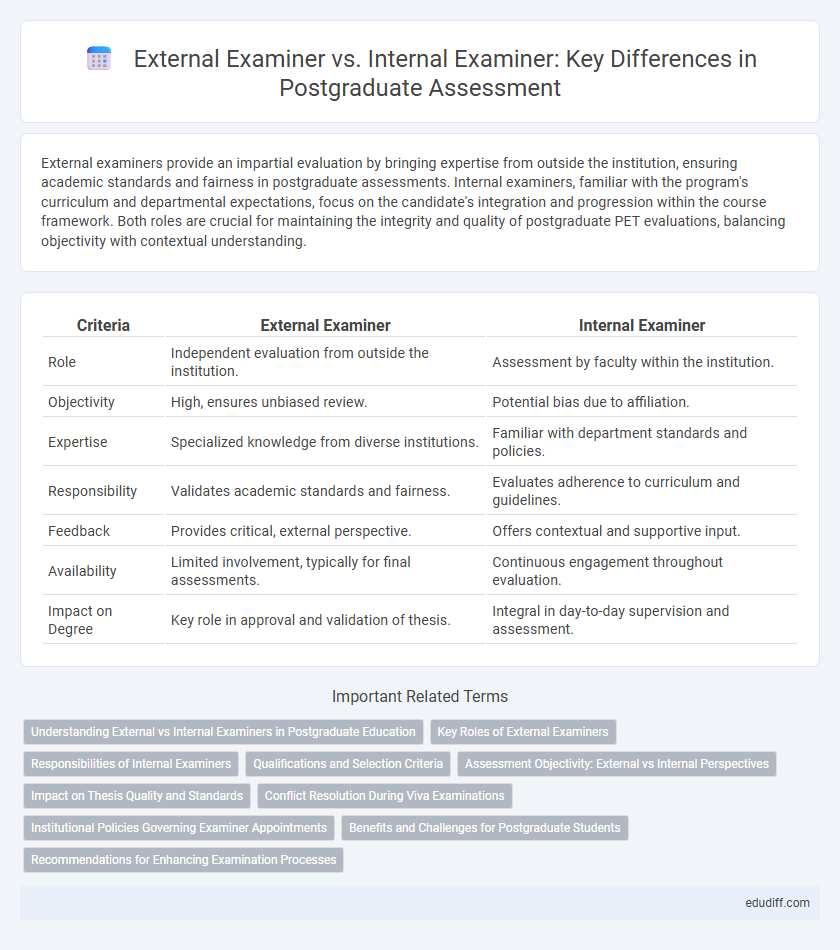External examiners provide an impartial evaluation by bringing expertise from outside the institution, ensuring academic standards and fairness in postgraduate assessments. Internal examiners, familiar with the program's curriculum and departmental expectations, focus on the candidate's integration and progression within the course framework. Both roles are crucial for maintaining the integrity and quality of postgraduate PET evaluations, balancing objectivity with contextual understanding.
Table of Comparison
| Criteria | External Examiner | Internal Examiner |
|---|---|---|
| Role | Independent evaluation from outside the institution. | Assessment by faculty within the institution. |
| Objectivity | High, ensures unbiased review. | Potential bias due to affiliation. |
| Expertise | Specialized knowledge from diverse institutions. | Familiar with department standards and policies. |
| Responsibility | Validates academic standards and fairness. | Evaluates adherence to curriculum and guidelines. |
| Feedback | Provides critical, external perspective. | Offers contextual and supportive input. |
| Availability | Limited involvement, typically for final assessments. | Continuous engagement throughout evaluation. |
| Impact on Degree | Key role in approval and validation of thesis. | Integral in day-to-day supervision and assessment. |
Understanding External vs Internal Examiners in Postgraduate Education
External examiners provide unbiased assessment by bringing an independent perspective to postgraduate evaluations, ensuring academic standards align with national or international benchmarks. Internal examiners, usually faculty members from the candidate's institution, offer in-depth knowledge of the specific research context and institutional policies. Together, both roles uphold the integrity and quality of postgraduate assessment through complementary oversight and expertise.
Key Roles of External Examiners
External examiners ensure impartial assessment and maintain academic standards by reviewing examination materials, moderating grades, and verifying the fairness of the evaluation process. They provide an independent perspective on the quality and consistency of postgraduate research and theses, benchmarking against national or international criteria. Their key role includes safeguarding institutional credibility and enhancing the integrity of academic awards.
Responsibilities of Internal Examiners
Internal examiners in postgraduate assessments are primarily responsible for ensuring the thesis meets institutional standards and adheres to academic guidelines. They provide detailed feedback on content, methodology, and presentation while safeguarding the integrity of the examination process. Their role extends to coordinating with external examiners and facilitating viva voce examinations to support comprehensive evaluation.
Qualifications and Selection Criteria
External examiners typically hold senior academic positions or possess recognized expertise in the specific discipline, often requiring a doctoral degree and a strong research portfolio. Internal examiners are usually faculty members affiliated with the institution, selected based on their subject knowledge, teaching experience, and involvement in the postgraduate program. Selection criteria for external examiners emphasize impartiality, international or national standing, and absence of conflicts of interest, whereas internal examiners are chosen for their familiarity with institutional standards and curriculum alignment.
Assessment Objectivity: External vs Internal Perspectives
Assessment objectivity in postgraduate exams benefits from the dual perspectives of external and internal examiners, where external examiners provide impartial evaluation grounded in broader disciplinary standards, while internal examiners offer nuanced insights informed by institutional context and candidate interaction. External examiners help mitigate institutional bias and uphold consistent academic standards across universities, enhancing the credibility and fairness of assessments. Internal examiners contribute detailed understanding of curriculum alignment and student progress, balancing objectivity with tailored academic judgment.
Impact on Thesis Quality and Standards
External examiners bring unbiased perspectives and subject-matter expertise, ensuring robust benchmarking of thesis quality against international standards. Internal examiners provide in-depth knowledge of institutional criteria and candidate progress, offering detailed feedback aligned with university expectations. The combined evaluation from both examiners enhances thesis rigor, academic integrity, and adherence to disciplinary norms, ultimately raising the overall standards of postgraduate research.
Conflict Resolution During Viva Examinations
Conflict resolution during viva examinations hinges on the distinct roles of external and internal examiners, where external examiners bring impartiality and external academic standards, while internal examiners ensure alignment with institutional policies and student progress. Effective communication between both examiners mitigates disagreements over assessment criteria, fostering a balanced evaluation that upholds academic integrity. The collaborative approach in resolving disputes enhances the credibility and transparency of the examination process in postgraduate studies.
Institutional Policies Governing Examiner Appointments
Institutional policies governing external and internal examiner appointments in postgraduate programs emphasize impartiality and academic rigor. External examiners are selected from outside the institution to ensure unbiased evaluation and uphold standards across universities, while internal examiners, appointed from within the institution, provide subject-specific insights and familiarity with institutional frameworks. Clear guidelines typically mandate qualifications, conflict of interest disclosures, and appointment procedures to maintain integrity and transparency in the examination process.
Benefits and Challenges for Postgraduate Students
External examiners provide unbiased assessment and uphold academic standards, ensuring fairness in postgraduate evaluations. Internal examiners offer detailed understanding of a student's research context but may have potential bias due to closer involvement. The challenges for students include navigating differing expectations and feedback styles between external and internal examiners, which can impact the clarity and direction of revisions.
Recommendations for Enhancing Examination Processes
External examiners provide unbiased evaluation by benchmarking against international academic standards, while internal examiners ensure alignment with institutional criteria and program learning outcomes. Recommendations for enhancing examination processes include incorporating joint calibration sessions to harmonize grading standards and increasing communication channels between external and internal examiners to foster consistency and transparency. Implementing standardized assessment rubrics and continuous training initiatives can further improve the reliability and fairness of postgraduate examinations.
External Examiner vs Internal Examiner Infographic

 edudiff.com
edudiff.com